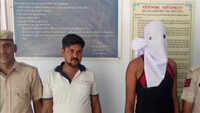
Coimbatore: Soon, it would be possible for anyone to just look at a map and know the nutrient levels of agricultural lands in each village across the state and decide which crops can be feasibly cultivated there.
The state agriculture department has undertaken a project under the ‘Soil Health Card Mission’ to create a ‘soil resource inventory and sampling’. Under this, officials are collecting soil samples from revenue villages across the state to analyze them and create thematic maps.
Soil sample collection began on May 2 across the state, and would be completed by the month-end, said officials of the agriculture department. Soil samples would be collected from a total of 16,689 revenue villages across the state, they said.
Soil samples would be collected from three pits of dimensions 50cmX50cmX50cm at three locations in each revenue village, said officials. From each pit two samples would be collected. In addition to this, 10 surface samples from each village would also be collected for the purpose.
After the samples are collected, in June they would be analyzed at soil testing laboratories to find out the nutrient content, pH level and electrical conductivity. Then, the results would be given to the officials of the Soil Survey and Land Use Organization, who would prepare theme-based maps showing the soil nutrition levels and soil pH levels. The maps would be given to the National Informatics Centre (NIC) to be uploaded in their portal and made available across the country.
Officials at the Coimbatore regional office of the agriculture department said Tamil Nadu was the first state to undertake the initiative under the Soil Health Card Mission, which is part of the National Mission for Sustainable Agriculture. Earlier, under the mission, around 53,000 famers in the district were given soil health cards for their individual farmlands. Now, the soil analysis is being done at village level to map the soil statistics across the state, said officials.
The soil tests would give a picture of the nutrients present in the soil, and thereby would help farmers be judicial in the use of fertilizers, said S Banumathi, joint director of agriculture, Coimbatore. “The maps which would be made using village-level data across the state would help in policy-making decisions,” she said.
In Coimbatore district, officials said, soil samples would be collected from 299 revenue villages. From each village, six profile samples would be collected from three pits and 10 samples would be collected from the soil surface, they said. Altogether a total of 4,784 samples would be collected from the district.
Officials said they have fixed latitudes and longitudes from where the samples would be collected. The district-level agriculture officers and field-level officers were specially trained or the purpose, they said. As the soil is collected from a depth of 50cm, the testing would yield a complete picture and history of the soil, they added.
The state agriculture department has undertaken a project under the ‘Soil Health Card Mission’ to create a ‘soil resource inventory and sampling’. Under this, officials are collecting soil samples from revenue villages across the state to analyze them and create thematic maps.
Soil sample collection began on May 2 across the state, and would be completed by the month-end, said officials of the agriculture department. Soil samples would be collected from a total of 16,689 revenue villages across the state, they said.
Soil samples would be collected from three pits of dimensions 50cmX50cmX50cm at three locations in each revenue village, said officials. From each pit two samples would be collected. In addition to this, 10 surface samples from each village would also be collected for the purpose.
After the samples are collected, in June they would be analyzed at soil testing laboratories to find out the nutrient content, pH level and electrical conductivity. Then, the results would be given to the officials of the Soil Survey and Land Use Organization, who would prepare theme-based maps showing the soil nutrition levels and soil pH levels. The maps would be given to the National Informatics Centre (NIC) to be uploaded in their portal and made available across the country.
Officials at the Coimbatore regional office of the agriculture department said Tamil Nadu was the first state to undertake the initiative under the Soil Health Card Mission, which is part of the National Mission for Sustainable Agriculture. Earlier, under the mission, around 53,000 famers in the district were given soil health cards for their individual farmlands. Now, the soil analysis is being done at village level to map the soil statistics across the state, said officials.
The soil tests would give a picture of the nutrients present in the soil, and thereby would help farmers be judicial in the use of fertilizers, said S Banumathi, joint director of agriculture, Coimbatore. “The maps which would be made using village-level data across the state would help in policy-making decisions,” she said.
In Coimbatore district, officials said, soil samples would be collected from 299 revenue villages. From each village, six profile samples would be collected from three pits and 10 samples would be collected from the soil surface, they said. Altogether a total of 4,784 samples would be collected from the district.
Officials said they have fixed latitudes and longitudes from where the samples would be collected. The district-level agriculture officers and field-level officers were specially trained or the purpose, they said. As the soil is collected from a depth of 50cm, the testing would yield a complete picture and history of the soil, they added.
#ElectionsWithTimes
Quick Links
Lok Sabha Election Schedule 2019Lok Sabha Election NewsDelhi Capitals teamMI team 2019Rajasthan Royals 2019RCB team 2019Maharashtra Lok Sabha ConstituenciesBJP Candidate ListBJP List 2019 TamilnaduShiv Sena List 2019AP BJP List 2019Mamata BanerjeeBJP List 2019 MaharashtraPriyanka GandhiBJP List 2019 KarnatakaAMMK Candidate List 2019BJP List 2019 WBLok Sabha Elections in Tamil NaduBSP List 2019 UPNews in TamilLok Sabha Poll 2019Satta Matka 2018PM ModiMahagathbandhanNagpur BJP Candidate ListChandrababu NaiduTamil Nadu ElectionsUrmila MatondkarNews in TeluguMadras High CourtTejashwi YadavArvind KejriwalTejasvi SuryaPawan KalyanArvind KejriwalYogi AdityanathJaya PradaSatta King 2019Srinagar encounter
Get the app









